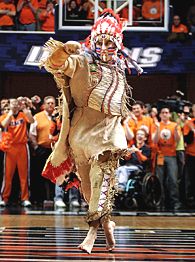The debate over the racist name and mascot of the professional football team based in the nation’s capital, the “Redskins,” has reached a fever pitch in recent months. Fifty U.S. senators signed a letter urging the National Football League, or NFL, to take action and change the name. The U.S. Patent and Trademark Office recently canceled several of the team’s trademarks because they were disparaging to American Indian and Alaska Native, or AI/AN, people and communities. And several media outlets across the country have stopped printing and using the name, including the San Francisco Chronicle, Slate, and The Seattle Times.
Much of the recent debate has centered on issues such as economics. Many fans and media commentators have debated the cost of changing the name for the team and the league. Others have focused on the “legacy” and memories that fans will lose with a new name. And perhaps the most referenced issue is the team’s supposed lack of racist or derogatory intent. But too much of the debate misses the point. It is not just about a name, a logo, a business, or a matter of intent. Racist and derogatory team names have real and harmful effects on AI/AN people every day, particularly young people.
To read more about this, visit Centre for American Progress or download a pdf of the report.
By Erik Stegman and Victoria Phillips, Centre for American Progress



Be the first to comment on "Missing the Point: The real impact of Native mascots and team names on youth"